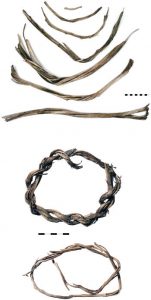Prehistoric finds from the Schnidejoch Pass in Switzerland’s High Alps reveal that people might have led their herds from Lower Valais to the Bernese Oberland and graze their sheep there during Bronze Age, around 5000 BC.

According to archaeologists Prehistoric herders in Lower Valais kept sheep and goats and undertook a two-day hike as far as the Bernese Oberland where they found good grazing opportunities below the Schnidejoch Pass situated at 2,756 metres above sea level. This nomadic pasture farming was only possible as the glaciers drastically retreated during the so-called Holocene Climatic Optimum and Schnidejoch Pass did not have any ice for several centuries. This was confirmed by numerous archaeological finds in the region as melting ice field on the Schnidejoch Pass has exposed several hundreds of objects since 2003. Indications of early alpine farming are also provided by the rings made out of plaited twigs which were used to hold the posts of mobile fences together. The rings originate from the Early Bronze Age (starting from 2100 BC)

Additionally pollen samples from Lake Iffig helped the reconstruction of the region’s vegetation history. From the composition of this pollen it can be deduced which plant species were very widespread in a specific location in the past. For example, nettles, among others, can be evidenced for the time after 5000 BC. These nutrient-loving plants frequently appear in places where cattle were fenced in overnight. Spores from the Sporormiella, a fungus that thrives extremely well on cattle dung was also found in the sediment core. There is also no indication of the Valais shepherds and their sheep in the lake sediments from Lake Iffig during a colder climatic phase just under a thousand years after the oldest Schnidejoch finds, as the route over the pass became impassable again.
(after Badri Redha, Kathrin Glauser & PhysOrg)